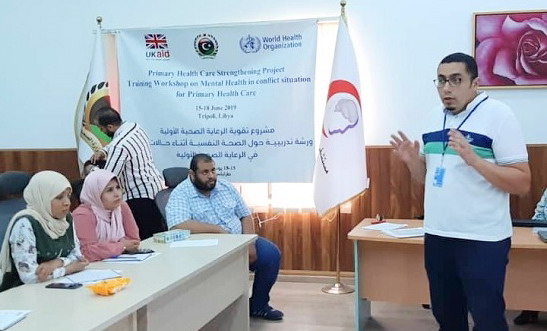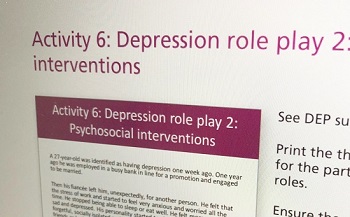
Read an interview about mental illness in Libya
Tripoli, 24 June 2019—The World Health Organization, in collaboration with Libya’s Ministry of Health, recently conducted a 4-day intensive workshop on mental health issues in conflict situations. The workshop was attended by 19 physicians from six of Libya’s primary care centres representing three different regions of Libya: east, south, and west.
“Years of war and uncertainty have taken their toll on the people of Libya,” says Dr Jaffar Hussain, WHO Representative in Libya. “They are suffering not just physically, financially, and socially, but also psychologically. Particularly in areas torn by crises, it is crucial to train primary health care workers to understand and treat mental illness.”
Building on a training that took place in January, WHO adapted its Mental Health Gap approach to the armed conflict situation in Tripoli, which began in April 2019. Participants use case studies, drama and role playing to act out how to identify and treat mental health issues including:
- Grief
- Anxiety and panic disorder
- Trauma and stress
- Somatisation and medically unexplained symptoms
- Psychosis: bipolar disorder and schizophrenia
- Substance abuse
- Children and adolescents in conflict situations
- Managing anger
Participants said they appreciated learning how to spot “hidden mental illnesses” and said they now felt they had the confidence and skills they need while working in family practice or in primary care settings. Twelve participants are serving the increasing number of people in Tripoli who have been displaced by bombing and airstrikes.
 During role play and other training exercises, WHO adopted its MHGap materials to the Libyan context
During role play and other training exercises, WHO adopted its MHGap materials to the Libyan context
The workshop, facilitated by Primary Care International and funded by the UK Department of International Development (DFID), will help expand the availability of mental health services in the country. Such services will now be offered now in six primary health care centers throughout Libya.
“Especially in some parts of Libya, mental health services have been very limited in the past,” says Dr Hussain. “With trained health care workers available, we can provide hope for people who are suffering from the pain of mental illness.”
Department for International Development (DFID)


